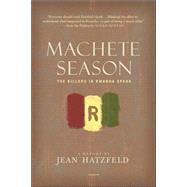- ISBN: 9780312425036 | 0312425031
- Cover: Paperback
- Copyright: 4/18/2006
During the spring of 1994, in a tiny country called Rwanda, some 800,000 people were hacked to death, one by one, by their neighbors in a gruesome civil war. Several years later, journalist Jean Hatzfeld traveled to Rwanda to interview ten participants in the killings, eliciting extraordinary testimony from these men about the genocide they perpetrated. As Susan Sontag wrote in the preface,Machete Seasonis a document that "everyone should read . . . [because making] the effort to understand what happened in Rwanda . . . is part of being a moral adult." Jean Hatzfeld, an international reporter forLiberationsince 1973, is the author of many books, including another on Rwanda,Into the Quick Life, and two on the war in Croatia and Bosnia. He lives in Paris. Linda Coverdale, the translator ofMachete Season, has translated more than forty books, including Tahar Ben Jelloun'sThis Blinding Absence of Light, which won the 2004 International IMPAC Dublin Literary Award. She lives in Brooklyn. Susan Sontagwrote several novels, stories, plays, and essays. Her books are translated into thirty-two languages. In 2001 she was awarded the Jerusalem Prize for the body of her work; in 2003, she received the Prince of Asturias Prize for Literature and the Peace Prize of the German Book Trade. Sontag died in December of 2004. AWashington PostBest Book of the Year The genocidal massacre of almost a million people in Rwanda more than a decade ago may be fading into history, but the killers are with us still, and so is the moral problem of trying to understand how such terrible crimes could have been committed. Jean Hatzfeld's account of conversations he had with some of the killers, now convicted and in jail--men who had rampaged across the fields, singing as they went, hacking to death 50,000 out of 59,000 of their neighbors--offers extraordinary insights into the nature of this collective crime. But, as Hatzfeld understands, the killers' words raised as many questions as they answer. The ten men Hatzfeld interviewed had been friends from childhood; they stayed together during their genocidal "job," as they called it, and then in their flight to exile in Congo, during their subsequent capture and trials, and now in prison. They freely spoke to Hatzfeld about what life had been like during those terrible weeks in the spring of 1994, and what they thought about what they had done. "The offenders know more than the basic facts," one acknowledges. "They have secrets in their souls." Another simply says, "Killing was less wearisome than farming." "A man is like an animal: you give him a whack on the head or the neck, and down he goes," says another. Why were they willing to talk? Did they distinguish truth from self-defensive evasion about this gruesome killing spree? Did they seek reconciliation, forgiveness, understanding? Were they remorseless, or did they suffer the nightmares of the damned? With an introduction by Susan Sontag, Hatzfeld's report on this horrific testimony is humane and wise, and he relates the unprecedented material he obtained from the genocidaires to what we know of other war crimes and genocidal episodes. It has sometimes been suggested that only depraved and monstrous men could perpetrate such crimes, but it may be, Hatzfeld suggests, that these terrible actions are within the realm of ordinary human conduct. "Harrowing. The reader is drawn in, in effect eavesdropping on a casual conversation among killers . . . Readers who can get beyond their (justified) initial horror will find a wealth of detail here about the genocide."--Alison Des Forges,The Washington<






